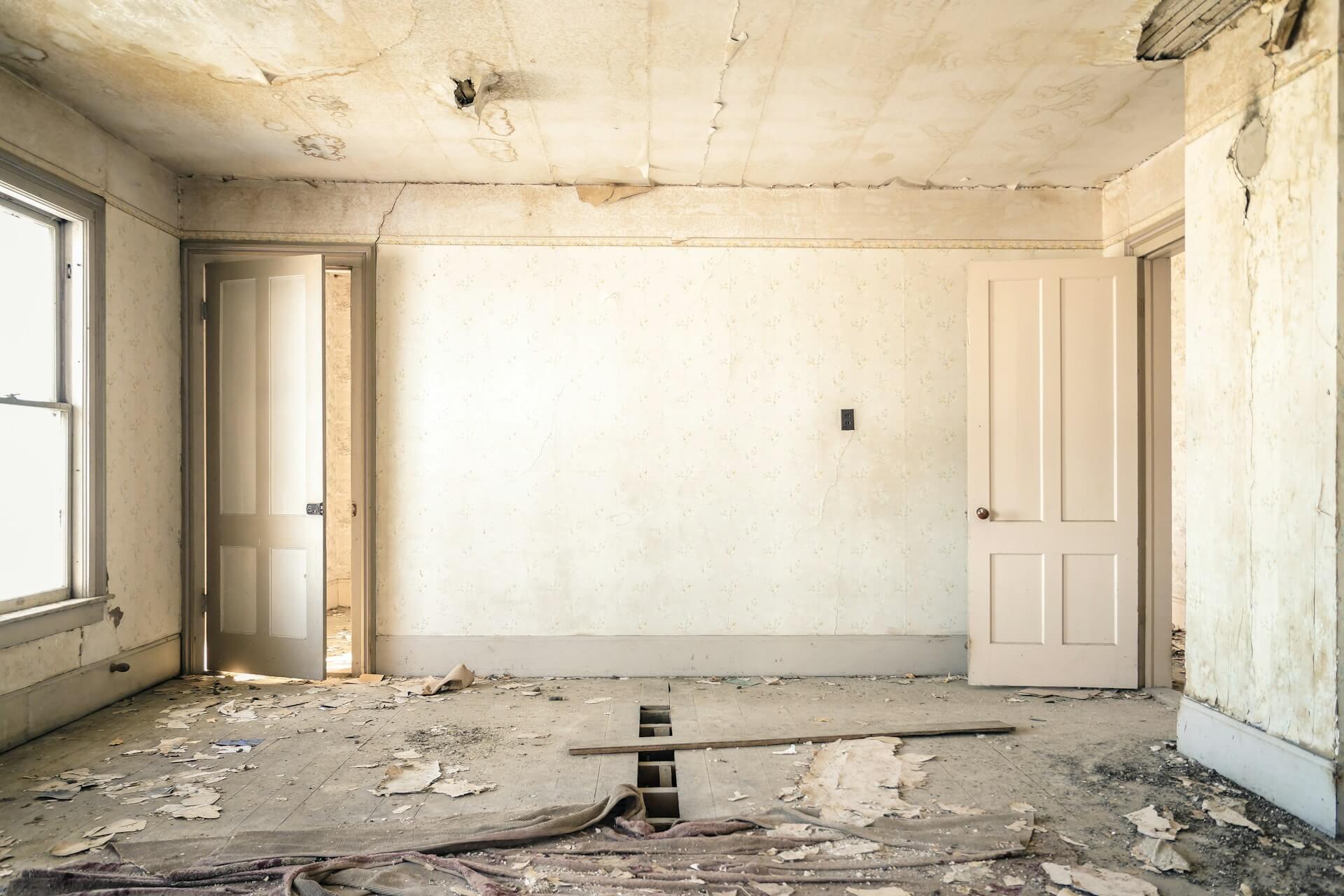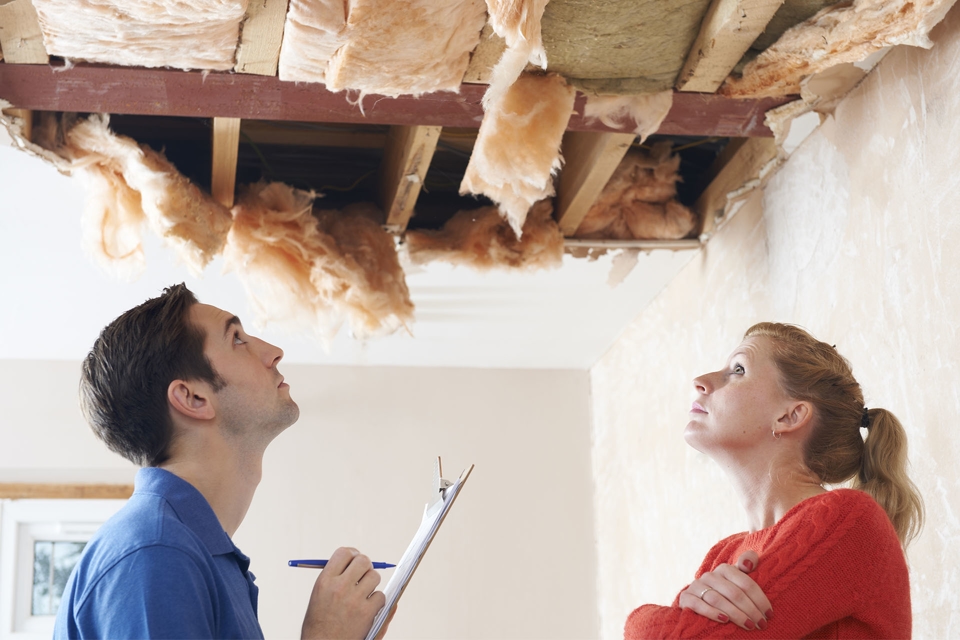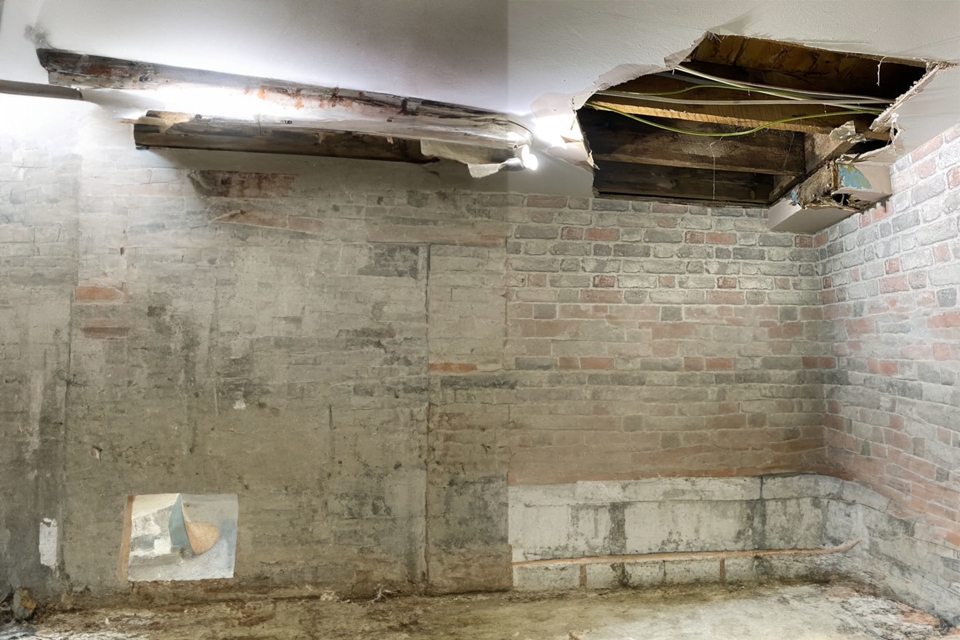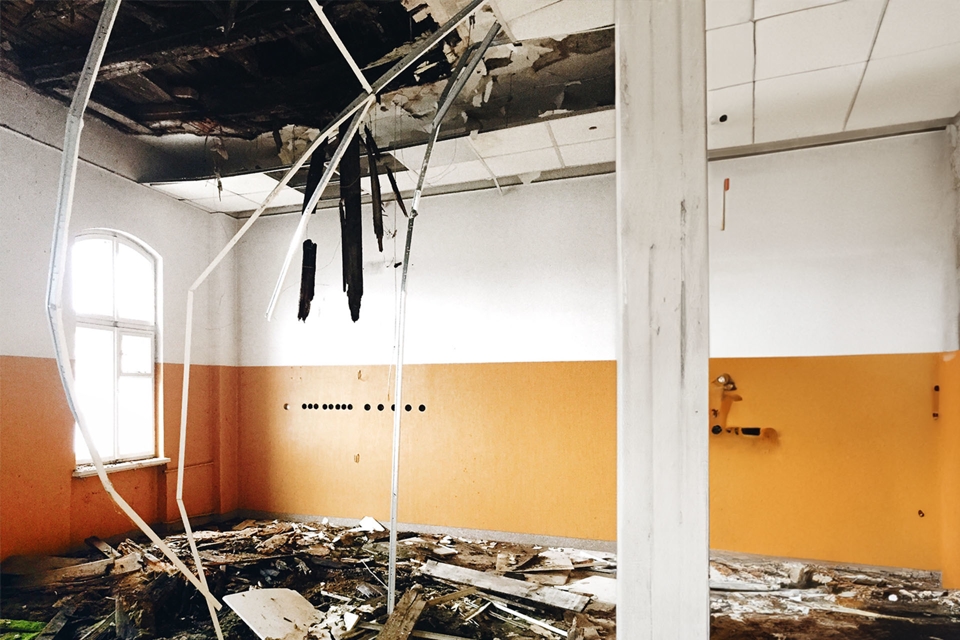When a ceiling collapses unexpectedly, your immediate priority is to ensure everyone's safety by evacuating the area. Next, you should contact the emergency services and start documenting the damage. Consulting a lawyer can help you understand your rights and navigate potential ceiling collapse claims.
In this guide, we'll focus on the other immediate actions to safeguard yourself and others and explore the legal aspects to seek proper recourse. Understanding your rights and responsibilities after a New York ceiling collapse is crucial, and we'll provide comprehensive insights to assist you every step of the way.
Here's what to do after your ceiling has collapsed in New York
Step 1: Ensure safety
Apartment ceiling collapses are truly frightening events that can happen without any warning signs, putting everyone in the home at serious risk. The suddenness of such incidents can cause significant injuries and even be life-threatening. When something like this happens, it's important to act quickly to make sure everyone is safe.
- Check for injuries: Immediately check yourself and others for any injuries resulting from the collapse. Don't hesitate to dial 911 or your local emergency number for assistance. Even if injuries seem minor, it's essential to get them assessed as soon as possible. What might appear to be a small bruise or cut could lead to complications if not treated properly. Additionally, some injuries, like concussions or internal bleeding, might not show immediate symptoms but can become serious if left unchecked. Make sure everyone affected gets a thorough medical evaluation to ensure their safety and well-being.
- Assess the situation: After ensuring everyone's safety, take a moment to assess the situation to determine the extent of the damage and any immediate risks. Look around carefully to gauge how severe the collapse is and identify any areas that may pose further danger. Be especially cautious of potential hazards like falling debris or weakened floors that could make the situation worse.
- Turn off utilities such as gas, water, and electricity to mitigate further risks, only if it's safe to do so. This step helps prevent additional damage and ensures the safety of residents. If you are unsure how to turn off utilities safely, it's best to contact a professional for assistance.
For expert legal guidance, get in touch with our personal injury lawyer in Brooklyn for an initial free consultation!
Step 2: Document the damage
A ceiling collapse involves any significant structural failure, such as the ceiling caving in or large portions falling. This also includes visible signs of damage that indicate potential collapse, such as prominent cracks, sagging, or accumulating debris on the floor below.
Recognizing these indicators is vital for accurately documenting the damage, which can be crucial for insurance claims, legal actions, and ensuring that necessary repairs are made to restore safety.
- Take photos and videos: Capture detailed photos and videos of the damage, ensuring you cover the affected area comprehensively from various angles. This documentation will serve as vital evidence for insurance claims or legal proceedings. Be sure to include close-up shots to highlight specific areas of concern.
- Note the time and date: Record the exact time and date the ceiling collapse occurred. This timestamp can prove invaluable for insurance claims and legal purposes, providing clear documentation of the incident's occurrence.
- Contact your landlord or property management: Immediately notify your landlord or property management about the ceiling collapse. Communicate the details of the incident, including the extent of the damage and any immediate safety concerns. Keep records of all communication with your property manager or land owner for future reference.
When contacting your landlord or property agent, be careful about admitting fault, even partially. Even the slightest slip-up could impact your legal rights. Instead, let our team handle all the communication
Step 3: Secure your belongings
This step is essential not only for preserving your valuable possessions but also for helping you get back on track more quickly. Taking the time to carefully salvage and document your belongings can make a significant difference in the overall recovery process, both emotionally and financially.
- Salvage what you can: Assess the area's safety to ensure there are no immediate hazards present, such as structural instability or electrical hazards. If it is safe, carefully retrieve priority items not significantly damaged by the ceiling. Wear appropriate protective gear, such as gloves and a mask, especially if debris or dust is present. Use sturdy containers or bags to transport salvaged items to a safe location away from the affected area.
- Document damaged possessions: Create a comprehensive list of all items damaged in the collapse. Include detailed descriptions and, if possible, photographs of each item. This documentation will be important when filing insurance claims or seeking reimbursement for damaged possessions.
- Keep track of all repair costs: Maintain a detailed record of all expenses for repairing or replacing damaged belongings. Keep receipts for materials, labor costs, and any other relevant expenses. This documentation will help you receive proper compensation for your losses during the claims process.
Step 4: Seek alternative accommodation
Securing alternative accommodation is essential until your living situation is resolved. Here are some steps you can take:
- Consider options provided by your land owner or property management for temporary housing arrangements. They may offer alternative units within the same complex or assist with finding accommodation elsewhere.
- Contact local emergency services or disaster relief organizations for assistance. They may be able to provide temporary shelter or direct you to available community resources.
- Review your emergency preparedness plan if you have one. This may include arrangements with friends or family for temporary accommodation or access to short-term rentals in the area.
Step 5: Understand your rights
Here's what you need to know about your rights and the steps you should take to protect them:
Review your lease agreement

This is an essential first step in understanding your rights and responsibilities, as well as those of your owners, regarding damages and emergencies. Pay close attention to sections outlining the landlord's obligations for maintaining the property's condition and addressing repairs promptly.
Look for clauses related to emergency procedures and how damages, such as a ceiling collapse, should be reported and remedied. Additionally, familiarize yourself with any provisions regarding liability for damages caused by negligence or failure to maintain the property adequately which falls under premises liability.
Tenant rights
New York State offers comprehensive protections for tenants to ensure fair treatment and stable housing conditions. In rent-controlled apartments across the state and in rent-stabilized apartments outside of New York City, specific protections are in place to prevent the eviction of certain tenants. These protections extend to:
- Senior citizens
- Individuals living with disabilities
- Anyone who has resided in the apartment for 15 years or more
The landlord cannot evict these tenants for owner occupancy. These regulations are designed to safeguard the rights of long-term residents and vulnerable populations, ensuring they can maintain their homes and communities without fear of displacement.
Additionally, here are some more rights that tenants have:
- Right to a Habitable Dwelling: Property owners are responsible for maintaining the premises in compliance with local housing codes, including providing essential services such as heat, hot water, and electricity.
- Protection Against Discrimination: It is illegal to discriminate against tenants based on protected characteristics such as race, gender, religion, disability, familial status, or sexual orientation. Tenants have the right to fair housing and cannot be denied housing or subjected to unfair treatment based on these factors.
- Lease Agreement Rights: Tenants have the right to review and sign a written lease agreement that clearly outlines the terms and conditions of the tenancy, including rent amount, lease duration, and landlord responsibilities. Property owners must adhere to the lease terms and cannot unilaterally change them without proper notice.
- Rent Regulation Protections: Rent-regulated apartments offer additional protections to tenants, including limits on rent increases and eviction protections. Tenants in rent-regulated units have the right to renew leases and protections against unjustified rent hikes.
- Right to Privacy: Property owners must provide proper notice before entering the unit for non-emergency purposes, except in cases of emergency or with the tenant's consent.
- Protection Against Retaliation: Under New York State law, building owners are prohibited from retaliating against tenants who assert their legal rights, such as filing complaints with housing authorities or organizing tenant associations. Retaliatory actions, such as eviction or rent increases, are also illegal.
- Security Deposit Rights: Tenants have the right to the return of their security deposit at the end of the tenancy, minus any allowable deductions for damages beyond normal wear and tear. Landlords must provide an itemized list of deductions and return any remaining deposit within a specified timeframe.
- Right to Repairs: If repairs are needed to maintain habitable living conditions, tenants can request timely repairs from their landlords. They must address repair requests promptly and maintain the premises in a state of good repair.
Landlord negligence
Landlord negligence refers to situations where a property owner fails to fulfill their legal obligation to maintain the rental property in a safe and habitable condition. This failure to adequately maintain the property can lead to various hazards and risks for tenants, including structural issues like a ceiling collapse.
In a ceiling collapse, negligent actions may involve ignoring signs of structural weakness, failing to address water leaks or damage, or neglecting necessary repairs and inspections.
Tenants often wonder, "How much should I settle for negligence ceiling collapse?" You may have grounds to pursue legal action against the property owner or manager to seek compensation for damages, including property damage, personal injuries, and related expenses. Determining the exact settlement amount will depend on the specific details of your ceiling collapse case and may involve filing a lawsuit for lack of action, breach of contract, or violations of state housing laws.
To address landlord negligence effectively and secure fair compensation, tenants should take the following steps:
- Document the Neglect: Keep records of any communication with the property owners regarding maintenance issues, including emails, letters, or photos documenting the property's condition before and after the incident.
- Notify the Landlord: Inform them promptly about the maintenance issues and request repairs in writing. Provide a reasonable timeframe for them to address the problem.
- Seek Legal Advice: If they fail to address the maintenance issues or if negligence leads to significant harm, consider consulting with a tenant rights attorney to understand your legal options and determine the best course of action.
- File Complaints: Report them to appropriate housing authorities or regulatory agencies. These agencies may conduct investigations and take enforcement actions against landlords for violations of housing codes or regulations.
- Document Damages: Keep records of any damages or losses resulting from the ceiling collapse, including property damage, medical bills, and other related expenses. This documentation will be essential if you decide to pursue legal action against the landlord.
Consult a ceiling collapse lawyer
Consider consulting a ceiling collapse attorney specializing in tenant rights and property law. A legal professional can help you understand your rights and obligations without having to sift through the fine print of your lease or insurance agreements. They provide clarity on what your landlord is required to do and what compensation you might be entitled to.
Our Queens personal injury lawyer can also handle the complex legal issues that often arise in these situations, ensuring that all necessary procedures are followed correctly. If your personal property has been damaged or you face expenses due to temporary relocation, they can advocate on your behalf for fair compensation, negotiating with landlords and insurance companies.
Find out how our expert personal injury lawyer can guide you on your next steps following ceiling collapse accidents in NYC
Step 6: Maintain communication
Staying connected is vital after a ceiling collapse. Maintain open channels with your landlord, property management, and neighbors, and be sure to document every interaction, whether it's a phone call, email, or face-to-face meeting. This documentation can be invaluable if any disputes arise or if you need to reference past communications for clarity.
Effective and consistent contact ensures everyone is aligned on repairs, safety concerns, and other issues. By keeping these lines of communication open, you can help facilitate quicker resolutions and a smoother recovery process overall.
Step 7: Insurance claims
Being prepared is key when figuring out insurance claims after a ceiling collapse. Start by gathering all the necessary documentation, including photos, videos, and communication records, with your land owner or property management. Be thorough in detailing the extent of the damage and any expenses you've incurred.
When interacting with insurance adjusters, remain calm and stick to the facts. Provide clear and concise information, and don't hesitate to ask questions if something is unclear. Being proactive and organized can increase the likelihood of a successful insurance claim and receiving the compensation you deserve.
What You Should NOT Do After a Ceiling Collapse
When a ceiling collapses, the first instinct might be to jump into action. However, it's best to approach the situation cautiously and avoid certain behaviors that could lead to further problems or endanger your safety.
- Enter the Affected Area Without Clearance: Immediately following an NYC ceiling collapse, it's imperative to avoid entering the impacted area without proper authorization from relevant authorities. Hidden hazards or structural instability may pose significant safety risks. Wait for experts' clearance before attempting to assess the damage.
- Attempt DIY Repairs on Significant Structural Damage: Engaging in amateur repairs could exacerbate the situation, leading to further damage or compromising the safety of the affected area. Moreover, unauthorized repairs might void insurance coverage, complicating potential claims.
- Ignore Safety Precautions: Avoid taking unnecessary risks, such as climbing on unstable surfaces or handling debris without proper protective gear. Adhere to safety guidelines and seek professional assistance promptly to mitigate potential hazards.
- Underestimate the Severity of Damage: Even seemingly minor collapses can conceal underlying structural issues or hazards requiring expert assessment and intervention. Take any signs of damage seriously and consult with qualified professionals to ensure thorough evaluation and appropriate remediation.
- Delay Seeking Professional Assistance: Prompt action is crucial to assess the extent of damage, address safety concerns, and initiate necessary repairs or remediation measures. Delaying professional intervention may prolong exposure to hazards and result in further complications or damage escalation.
Maximize your claim: Expert legal advice is just a call away!
When facing the aftermath of a ceiling collapse, securing expert legal guidance can make all the difference in safeguarding your rights and maximizing your claim. At Ajlouny Injury Law, our experienced NYC ceiling collapse lawyers specialize in handling property damage and tenant rights cases.
Whether you're negotiating with landlords or insurance companies or considering legal action, we're here to provide knowledgeable support every step of the way. Don't navigate the complexities of your situation alone.
Call us today and schedule a free consultation to take the first step towards securing the compensation you deserve.
FAQs
Are ceiling collapses common?
They are relatively rare but various factors such as structural weaknesses, water damage, or age-related deterioration can cause a ceiling to collapse. While they may not be frequent, they pose significant risks to occupants and require immediate attention.
Can a ceiling suddenly collapse?
Yes, ceilings can collapse suddenly, often without warning. Factors such as water damage, structural issues, or heavy loads can weaken ceilings over time, leading to sudden collapses that pose serious safety hazards to occupants.
How much does it cost to fix a caved-in ceiling?
The cost of fixing a collapsed ceiling can vary depending on the extent of the damage, materials needed, and labor costs. Minor repairs may cost a few hundred dollars, while extensive damage requiring structural repairs could cost several thousand dollars.
Is ceiling collapse covered by insurance?
Whether ceiling collapse is covered by insurance depends on the specific terms of your policy. In many cases, homeowner's insurance policies cover damage caused by sudden events like ceiling collapses, but it's essential to review your policy and consult with your insurance provider for clarity.
Share This Story
Interested in this topic? Your friends might be too! Consider sharing this story to your social media channels and look like a smart, sophisticated resource of information.
What is Your Case Worth?
Call Now and Find Out For Free!
Unhappy with your lawyer? Get a free second opinion!






